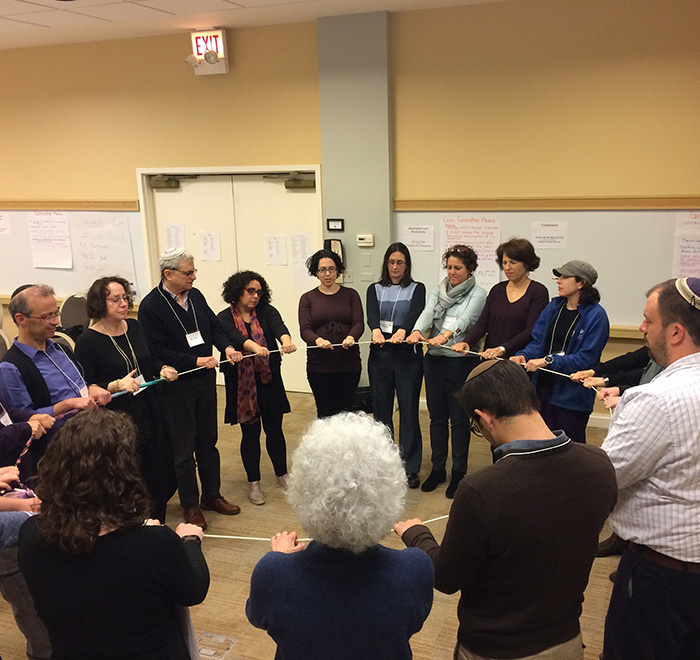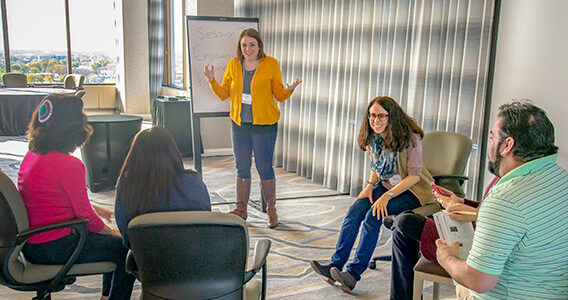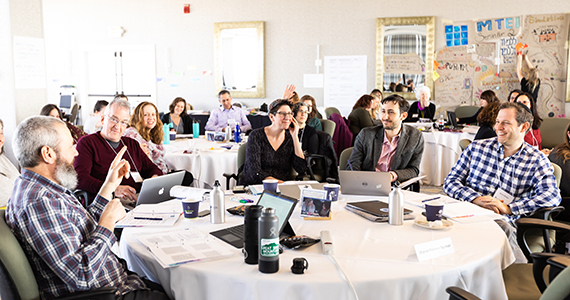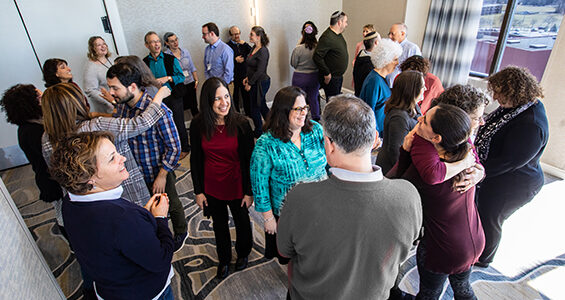About the Program
MTEI participants are a remarkably diverse group of Jewish educators who work in varied settings, with similar goals. As educational leaders, MTEI participants want to support the teachers they work with to keep learning and growing as Jewish educators. At MTEI, we take the time over two years to create a community of colleagues, learning together and supporting one another. When the program is over, many MTEI participants stay in touch with one another, continuing the professional friendships they have developed.

MTEI Principles for Professional Development
Jewish learning at the core.
We value Jewish learning, broadly conceived, and the exploration of central ideas and themes of Judaism and Jewish history. In particular, we consider interpreting and dialoguing with Jewish texts that focus on big Jewish ideas, while dialoguing with fellow learners, to be a vital component of Jewish education. Thus, we also believe that one of the core aims of professional development for Jewish educators should be to gain fluency in interacting with big Jewish ideas and texts.
Teacher, learner, and content, in a context.
These four elements are inextricably and dynamically linked. The connections among them are essential foci of collaborative inquiry, because they are key to understanding and enacting teaching and learning. As we support educators to investigate teaching and learning, we emphasize the experience of learners, in their interaction with the other elements.
Learning rooted in creative, collaborative inquiry.

We believe that collaborative learning has a variety of strengths that individual learning does not; that learning with colleagues deepens understanding, empathy, and discovery; builds community; adds meaning and purpose; and improves practice. Inquiry is at the core of studying texts, investigating teaching practices, learning about learning, and learning from each other in community.. We take our place in the lineage of Jewish learning across time, which calls for a moral and practical commitment to our colleagues’ learning.
Intentional creation of community.

Creating a community of collaborative inquiry is ongoing, intentional work that supports and is supported by the relational environment we create. To “create community,” we consciously set up structures to help participants learn and imagine collective possibilities together; to approach learning with a sense of playfulness and joy; to feel comfortable taking risks; and to develop trusting relationships. This kind of environment — what we call a “relational learning community”— fosters learning. As experiencing a sense of community fosters learning, so, too, learning together fosters the creation of community. Thus, building a relational, collaborative learning community is both how we do our work as well as an outcome of our work.
Embracing our diversity and our commonalities.

Jews are a multi-racial, multi-ethnic, multicultural, multi-denominational people, with additional other identities. We practice Judaism in dramatically different ways and hold different views about many core aspects of Judaism. Yet in the context of our diversity, we strive for participants to feel at home and feel a common sense of mission around Jewish education. We believe that learning together, in a diverse group, materially strengthens our collective learning and growth and strengthens our mission to enrich Jewish education in all the corners of Jewish life that we reach.
How we talk matters.
We strive to recognize and practice ways of speaking that serve learning and human connection. As one example, we practice the skills of “supporting” and “challenging,” within the context of interactive study – both of Jewish sources and of examples of teaching. More generally, we study and practice skills for talking across differences, including empathic listening, speaking up bravely, and honoring multiple perspectives. These practices can help deepen self-awareness, strengthen trust, promote learning, and create a culture in which disagreement is dynamic and productive.
Teachers learn and learners teach.
We believe that core to being a learner is having the opportunity to teach others and to share knowledge, perspectives, and interpretations. We believe that core to being a teacher is recognition of the need to continue one’s own learning and to support the ongoing learning of others. We learn as we teach and we teach as we learn. We celebrate this blending of teaching and learning, teacher and learner, and strive to set up systems that enhance this blending and make it explicit.
Leading for learning and empowering new leaders.
We conceive of school and organizational leadership as the creation and sustenance of communities of educators who engage in continuous improvement and collaborative leadership through learning together and studying teaching together. These kinds of collaborative, relational learning communities build capacity and intentionally support the empowerment of new leaders.
There is moral meaning in the work we do.

Our principles, taken together, reflect our belief in participatory, democratic, equitable models of teaching and learning, in collaborative models of leadership, and in the pluralism we embody. We try to model these values in everyday actions and to reflect on them regularly. We believe that a core aim of Jewish education – and thus of professional development for Jewish educators – is to nurture our capacities to create more just, equitable, and healing ways of being in the world. We rely on these principles to remind us of this core value and to help us get there.
Applications for Cohort 12 Open Fall 2025
Living MTEI Principles: There is Moral Meaning in the Work We Do.
Living MTEI Principles: Teacher, Learner, and Content, in a Context.
Senior Family Educator at The Kitchen“MTEI has given me a safe, productive, and generative space to deeply think through who I am as a learner, a teacher, and a teacher of teachers. I’ve added to and developed my toolkit of teaching and learning tools with colleagues from across the country and developed professional and personal relationships that have helped make me a better practitioner, educator, and person.”
Director of Education, Central Synagogue NYC“MTEI is an incredible professional development opportunity with thoughtful and engaged colleagues and responsive and committed teachers. For anyone who thinks they don’t have enough time to help their teachers improve their instruction, MTEI gives you the space and the support to do it.”